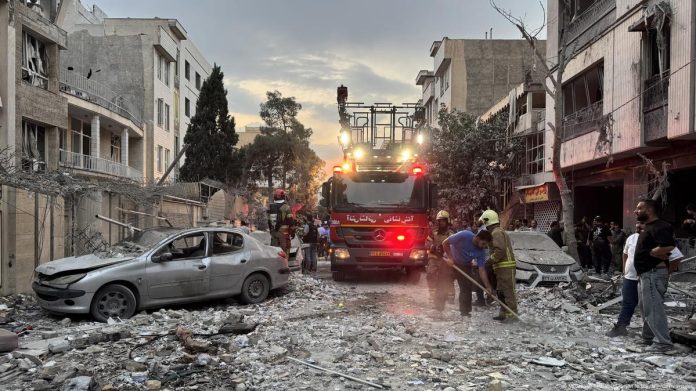Israel and Iran exchanged heavy fire again on Tuesday, marking the fifth consecutive day of their most intense confrontation to date. The escalating conflict has sparked fears of a drawn-out war with the potential to destabilize the entire Middle East.
Shadow War Turns Open Conflict
After years of covert operations and proxy battles, including Israel’s fight against Iranian-backed groups like Hamas since October 2023, the conflict has now erupted into direct military engagement.
Latest Attacks
On Tuesday, Israel launched “extensive” airstrikes targeting missile and drone facilities in western Iran. Explosions and plumes of smoke were reported in Tabriz, where a major Iranian air force base is located.
Meanwhile, loud blasts were heard over Jerusalem and Tel Aviv. Shrapnel caused property damage, and fires broke out in commercial areas, though no casualties were reported in those cities.
According to Iran’s health ministry, Israeli strikes have so far killed at least 224 people and wounded over 1,200. Israel, in turn, has reported 24 dead and 592 wounded from Iranian attacks.
The Israeli military claims to have killed numerous senior commanders and nuclear scientists, and to have destroyed one-third of Iran’s surface-to-surface missile launchers. “We have now achieved full air superiority over Tehran,” said IDF spokesman Effie Defrin.
Israel’s Military Objectives
Prime Minister Benjamin Netanyahu said Israel’s campaign seeks to “change the face of the Middle East,” by targeting three primary goals:
Dismantling Iran’s nuclear program
Destroying its missile production capabilities
Eliminating Iranian-backed terror networks in the region
He added that Israel’s actions are closely coordinated with the United States and did not rule out targeting Iran’s Supreme Leader, Ayatollah Ali Khamenei.
Evacuations and Global Reactions
As fighting intensifies, mass evacuations are underway. U.S. President Donald Trump urged Tehran residents to evacuate immediately, though he gave no further context. China, India, and Thailand have also advised their citizens to leave the conflict zones.
Israel issued evacuation orders for District 3 in northern Tehran — home to the state broadcaster IRIB — which was later hit in an Israeli strike. Iran called the attack a “war crime,” while the IRIB reported three deaths in the strike.
Residential areas in both countries continue to suffer deadly hits. Iran said its drones had successfully struck strategic locations in Tel Aviv and Haifa, including the homes of Israeli military leaders and scientists.
Diplomatic Pressure Mounts
Global powers are pushing for restraint. China urged both countries to reduce tensions immediately. Turkey’s President Erdogan offered to mediate, while French President Emmanuel Macron warned against attempting to overthrow Iran’s regime, calling it a “strategic mistake.”
UK Prime Minister Keir Starmer said G7 leaders were aligned in seeking de-escalation. At the summit in Canada, Trump reiterated that “Iran is not winning this war” and advised talks “before it’s too late,” though he left early to handle what he called “something much bigger than a ceasefire.”
Nuclear negotiations between Iran and the U.S., planned for Sunday, were canceled after Israel launched its surprise strikes.
In a final statement, the G7 urged an immediate de-escalation in the Israel-Iran conflict as a first step toward restoring regional stability.
Concerns Over Nuclear Sites
Netanyahu has insisted that Israel’s offensive is aimed at eliminating the existential threats posed by Iran’s nuclear and missile capabilities.
The UN’s International Atomic Energy Agency (IAEA) reported that while above-ground facilities at Iran’s Natanz site had been hit, there were no signs of damage to its underground sections and radiation levels remained normal.



